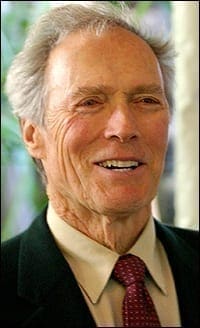Over the years, Hollywood icon Clint Eastwood has uttered many memorable lines in many memorable movies. “Go ahead, make my day,” in Sudden Impact. “You’ve got to ask yourself one question: Do I feel lucky? Well, do ya, punk?” inDirty Harry. “Girlie, tough ain’t enough,” in Million Dollar Baby.
But the most revealing line Eastwood ever uttered may have been to USA Today (January 25, 2004), when he said, “I like the libertarian view, which is to leave everyone alone.” The quote confirmed that Eastwood is not just one of Hollywood’s most honored and longest-lasting stars, but perhaps America’s highest-profile libertarian.
Eastwood has made no secret of his pro-liberty views. He first hinted at his politics in Parade magazine (January 12, 1997) when he wrote about government: “Abuse of power isn’t limited to bad guys in other nations. It happens in our own country if we’re not vigilant. Those in power get jaded, deluded and seduced by power itself.” He explicitly went on the record as a libertarian in a March 1997 Playboy interview, when he was asked: “How would you characterize yourself politically?” Eastwood replied: “Libertarian… Everyone leaves everyone else alone.”
He reiterated that with his 2004 USA Today quote, and then elaborated when asked about same-sex marriages. Eastwood replied: “From a libertarian point of view, you would say, ‘Yeah? So what?’ You have to believe in total equality. People should be able to be what they want to be and do what they want — as long as they’re not harming people.”
Then, just to confirm that his views were neither conservative nor liberal, Eastwood was quoted in an undated profile in the British magazine Hello as saying, “There’s a rebel lying deep in my soul. Anytime anybody tells me the trend is such and such, I go the opposite direction. I have a reverence for individuality… I’ve always considered myself too individualistic to be either right-wing or left-wing.”
Eastwood’s career is an example of that individualist approach. Through hard work and talent, he went from playing bit parts in low-budget movies to become one of the world’s biggest box office stars. Then, at a stage in his life when most actors would be content to bask in fading glory, he reinvented himself as a highly respected Academy Award-winning director.
Born in 1930, Eastwood did a stint in the U.S Army and briefly attended Los Angeles City College before dropping out. He turned to acting, and made his movie debut in Revenge of the Creature (1955). Other nondescript movie roles followed — in Tarantula (1955), The First Traveling Saleslady (1956), and Escapade in Japan (1957). From 1959-1966, he starred in a TV western, Rawhide, and got his first taste of national fame. That role led to an invitation to star in a trio of Sergio Leone “spaghetti westerns,” A Fistful of Dollars (1964), For a Few Dollars More (1965), and The Good, the Bad and the Ugly (1966). Eastwood’s laconic character, The Man With No Name (dressed in a signature flat-brimmed sombrero and shabby poncho), captivated audiences around the world, and served as a template for his later taciturn “tough-guy” roles. The movies made Eastwood an international star.
The coming years brought a wider variety of roles. He appeared in Where Eagles Dare (1968), Paint Your Wagon (1969), and Kelly’s Heroes (1970). In 1971, he hit pay dirt again with Dirty Harry. As .44 Magnum-wielding police inspector Harry Callahan, he created one of his most memorable characters and tapped into a growing national concern about crime. That same year, he got his first job behind the camera, directing Play Misty for Me. For the rest of the 1970s and 1980s, he alternated between action thrillers and oddball comedies, starring in Magnum Force (1973), High Plains Drifter (1973), The Eiger Sanction (1975), The Outlaw Josey Wales (1976), The Gauntlet (1977), Every Which Way But Loose (1978), Escape From Alcatraz (1979), Pale Rider (1985), Heartbreak Ridge (1986), and Pink Cadillac (1989). During those same years, Eastwood began a long strong of appearances on Quigley Publications’ annual Top 10 Poll of Money-Making Stars. (In all, he appeared on the list 21 times.)
By the late 1980s, Eastwood began to expand his artistic horizons. He directed Bird, a biography of jazz great Charlie “Bird” Parker (1988) and White Hunter, Black Heart (1990), loosely based on the life of director John Huston. In 1992, he put a capstone on his career when he directed and starred in Unforgiven. The movie, a gritty “revisionist” western about an aging gunfighter, offered a stark contrast to his previous, violence-glorifying westerns. Unforgiven earned an Academy Award for Best Picture, and Eastwood won for Best Director. Other popular movies followed, including In the Line of Fire (1993), The Bridges of Madison County (1995), Midnight in the Garden of Good and Evil (1997), Absolute Power (1997), Mystic River (2003), and Flags of Our Fathers (2006).
In 2004, Eastwood scored a knockout punch with Million Dollar Baby. Like Unforgiven, it turned a genre’s clichés upside down; this time by transforming a feel-good boxing movie into an unflinching examination of a tragic disability. Million Dollar Baby won Eastwood a second Best Director Academy Award, and also picked up a trophy for Best Picture. In 2006, his World War II film Letters from Iwo Jima won the Golden Globe for Best Foreign Language Film.
Eastwood has interests outside of acting and directing. He’s a longtime jazz fan (and wrote music for nine of his movies, including Million Dollar Baby and Mystic River). In 1986, he was elected mayor of Carmel-by-the-Sea, California, and served a two-year term. He’s also become an outspoken critic of the federal Americans with Disabilities Act (ADA), after an inn he owns was hit by an ADA lawsuit. In 2000, he testified before Congress in support of a bill that would help protect small-business owners from such opportunistic lawsuits.





















